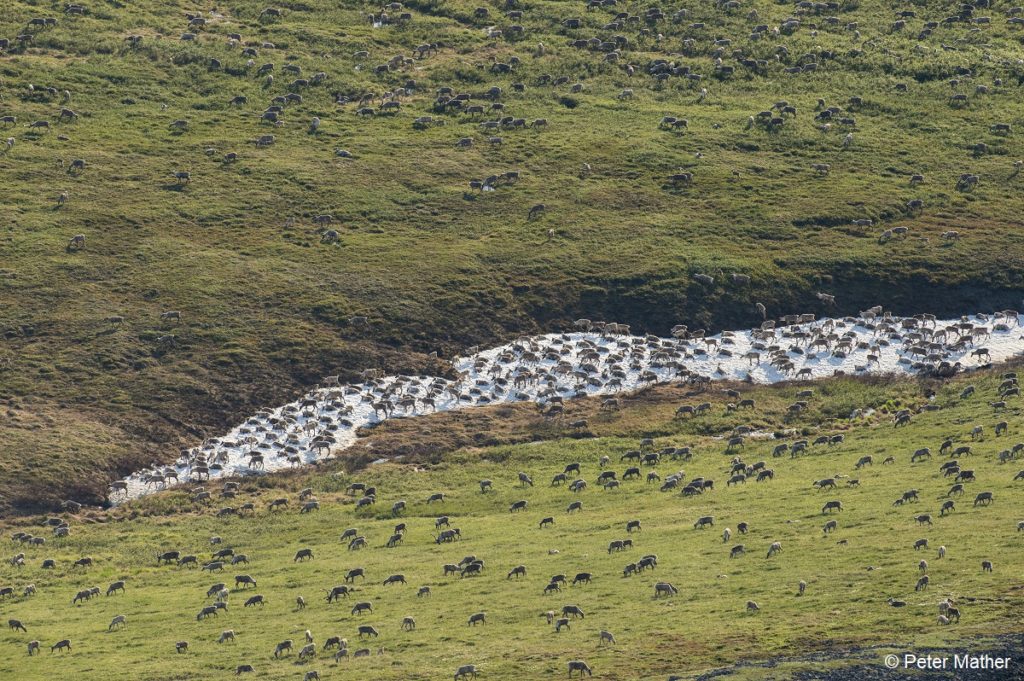A new day in Washington, D.C., a new day for Alaska

Cover photo: Caribou blanket the coastal plain of the Arctic National Wildlife Refuge. (Peter Mather)
On January 20, on his first day in office, President Joe Biden made good on his commitment to protect the Arctic National Wildlife Refuge, placing a temporary moratorium on all oil and gas leasing activities on its coastal plain.
There is work still to be done to wind back oil leases sold and issued in the final days of the Trump presidency and to repeal the 2017 statutory leasing mandate. But there’s no doubt that January 20 was a day to celebrate and to exhale in the knowledge that a critical first step has been taken toward long-term, durable protections for one of the last great expanses of untouched wilderness areas in America.

Still, it’s difficult to let go of the anger toward the reckless and dishonest way that Trump officials pushed the process forward, ignoring science and the voices of Indigenous peoples in the process.
It’s also hard to look back on the first ever Arctic Refuge lease sale on January 6 without also considering what was happening in Washington, D.C., at the exact same moment — insurgents violently pushing past Capitol police to break into one of our nation’s most sacred buildings. At the League, we found ourselves ping-ponging back and forth between crunching lease sale bid numbers announced over Alaska’s Bureau of Land Management live stream and watching the violence and horror on Capitol Hill continued to escalate — some of us from less than a mile away from the violence.
With the benefit of hindsight, the parallels of these events are striking. As a national advocacy organization for Alaska’s federal lands and waters, the Capitol building has been where some of the most important milestones for our work have taken place. I personally stood just off the Senate floor in 2005 when Arctic Refuge drilling was removed from a defense spending bill, one of many past Congressional fights to defend this sacred land. That day was just one moment in the deep history that that building has seen. The Capitol building is a sacred place and has for decades sat at the epicenter of the fight to protect the sacred lands of the Gwich’in people. Last Wednesday, we saw efforts to destroy both. And yet, today, we feel as confident as ever that these two hallowed places — the U.S. Capitol Building and the Arctic Refuge coastal plain — will come together again, and we will celebrate a victory for the protection of the Arctic Refuge in the not-too-distant future. Here’s why:
The first-ever lease sale was an ‘epic failure’
The first Arctic Refuge lease sale was, simply put, an embarrassment. With more than a million acres of iconic landscape up for bid, the sale generated little more than $12 million — less than 1% of the $1.8 billion total that was promised in the lead up to the 2017 Tax Act. No major oil company even showed up. As Alaska Public Media put it, “it was a striking moment in a 40-year fight over drilling in the coastal plain, an area that’s home to migrating caribou, polar bears, birds and other wildlife…”

What’s more, the vast majority of the Arctic Refuge leases were bought by a State of Alaska owned organization — the Alaska Industrial Development and Export Authority (AIDEA). AIDEA is essentially an Alaska government ‘slush fund’ known as the grim reaper of Alaska megaprojects. This means that the State of Alaska, which has for decades touted the hundreds of thousands of jobs and billions of dollars in revenue that Arctic Refuge leasing would bring TO the state and federal government, is now SPENDING millions on a leasing effort that has been rejected by every major U.S. and Canadian bank and trillions of dollars of other investors. Plus there’s the millions more they’ll have to pay in rental fees each year going forward, as no revenue comes in.
As AIDEA rushed to hold a board meeting to authorize its ability to buy leases days before Christmas, during a woefully limited public comment hour, the outrage was clear, with Alaskans asking why, as climate change ravishes the state and the global oil industry declines, doesn’t the state invest in diversifying Alaska’s economy instead of buying “a ticket to decades of litigation.”
The AIDEA board meets tomorrow, and Alaskans are watching.
— NorthernCenter(NAEC) (@NorthernCenter) January 13, 2021
AIDEA needs to focus on its mission to diversify Alaska’s economy, and the Legislature can and should hold them accountable to this mission. #ProtecttheArctic #BadAIDEA https://t.co/XadFyjUSeG
Seismic permitting ran out of time
The U.S. Fish and Wildlife Service (FWS) failed to approve pending permits for an aggressive seismic exploration program prior to noon on January 20, and any further action on the permits has been halted under the Biden moratorium on leasing activities. In the past month, more than 6 million public comments were submitted to FWS in opposition to seismic testing, with many identifying serious, substantive problems with the proposal’s conclusion regarding harm to polar bears. This was a historic outpouring of public involvement for a single FWS comment period, and the agency was obligated to respond to all substantive comments, helping to delay the permit long enough for the administration change.
The winds have now shifted dramatically
President Biden ran on and was elected on the most ambitious climate agenda in history, which included making the protection of the Arctic Refuge a day one priority. And now his team has halted oil activities in order to analyze the drilling process in its entirety. In addition, the entire basis for holding a lease sale is still being litigated in court — together with our Gwich’in and conservation allies and 15 States’ Attorneys General, we are challenging the underlying environmental review for the entire oil and gas program. The President’s announcement also provides that the Attorney General can inform a court of this order and request a stay to that pending litigation.
President Biden’s nominee for Secretary of the Interior, Representative Deb Haaland, member of the Pueblo of Laguna tribe of New Mexico, is a “passionate foe” of drilling in the Arctic Refuge. And with Democrats now in control of the U.S. Senate following victories in both Georgia special elections, we look forward to many future trips to the Capitol in the effort to repeal the Arctic Refuge drilling mandate.

We echo @greenpeaceusa‘s sentiments and applaud the selection of @RepDebHaaland to be next Interior Secretary! She has stood with us and the Gwich’in to protect the Arctic National Wildlife Refuge!
— Alaska Wilderness League (@alaskawild) December 17, 2020
Our Statement: https://t.co/SAEyUs4Dcv #ProtectTheArctic #StandWithTheGwichin https://t.co/3t6yrlvzRS pic.twitter.com/l0DbC6eHPb
It’s a new day in Washington, D.C., but also a new day for Alaska. As Alaska Director Andy Moderow put it: “Alaska’s public lands provide endless opportunities and define an Alaskan way of life that is worthy of protecting for future generations. These places can also serve as a bedrock of a modern economy. Clean air, lands and waters are only becoming scarcer, and tourism, fisheries, renewable energy, and robust education systems can be our future. For that, we will continue to fight!”
